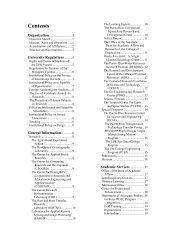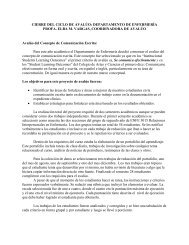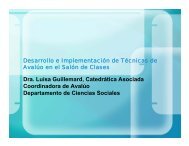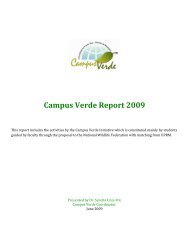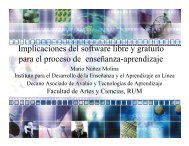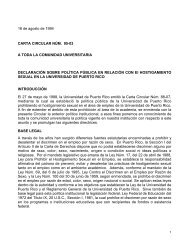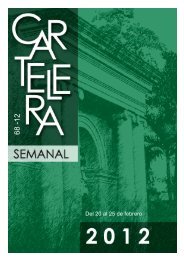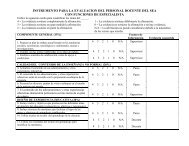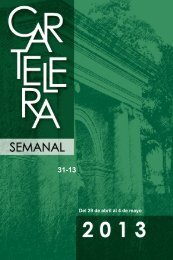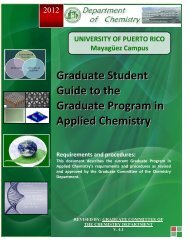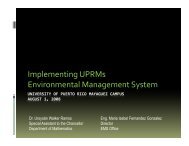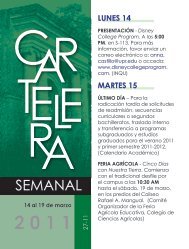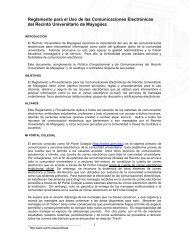Undergraduate Catalogue - UPRM
Undergraduate Catalogue - UPRM
Undergraduate Catalogue - UPRM
Create successful ePaper yourself
Turn your PDF publications into a flip-book with our unique Google optimized e-Paper software.
10<strong>UPRM</strong> Regulations<br />
Academic Progress and<br />
Economic Assistance Eligibility<br />
The Federal Department of Education, through a<br />
circular letter in October 1994, notified<br />
educational institutions of the need to establish,<br />
publish, and apply reasonable norms which<br />
measure the student’s academic progress for the<br />
purpose of determining economic aid eligibility<br />
in Title IV programs. These cannot be less<br />
restrictive than those applicable to the general<br />
student population.<br />
The Board of Trustees of the University of<br />
Puerto Rico, through Certification Number 054<br />
(2000-2001), established the Institutional Policy<br />
on Academic Progress for Eligibility to the<br />
Programs of Economic Assistance. All students<br />
are hereby notified of the criteria to be satisfied<br />
at the end of the academic year to maintain their<br />
possible eligibility and participate in economic<br />
aid programs.<br />
Criteria Applicable to <strong>Undergraduate</strong><br />
Academic Evaluations<br />
1. By the end of the academic year, the<br />
student’s grade level must have reached the<br />
minimum retention index applicable to the<br />
respective year of studies. See table below.<br />
Year of<br />
Studies<br />
Retention<br />
Index<br />
First year 1.70<br />
Second year 1.90<br />
Third year 1.95<br />
Fourth year 2.00<br />
For the purpose of these guidelines, one<br />
year of study is defined as two semesters in<br />
which the student registers a minimum of<br />
12 degree credit-hours. Courses taken<br />
during the summer immediately following<br />
the evaluation do not affect adversely or<br />
favorably a student’s status.<br />
Students on probation will be ineligible to<br />
receive economic aid during that year<br />
unless they comply with other criteria<br />
established for academic progress.<br />
2. A student may receive economic aid as<br />
long as 150% of the normal time<br />
required for obtaining an academic<br />
degree is not exceeded.<br />
3. The equivalent number of years studied<br />
is determined according to the total<br />
number of credits attempted or enrolled<br />
as shown in the table below.<br />
Number of registered<br />
credits per semester<br />
Equivalent years of<br />
study<br />
1-5 .125<br />
6-8 .250<br />
9-11 .375<br />
12 or more .500<br />
4. The determination of academic<br />
progress for transfer students from<br />
other institutions is made by examining<br />
the equivalent number of years<br />
studied, the total number of credits<br />
attempted up to the time of transfer and<br />
the number of credits approved.<br />
5. A student may receive economic aid<br />
only if he or she does not exceed 150%<br />
of the normal time required for<br />
obtaining the degree.<br />
The equivalent number of years studied and<br />
enrolled credits will be considered by using<br />
the following table:<br />
Equivalent<br />
Years Studied<br />
Academic Progress According to<br />
Degree Credits Approved<br />
Four Years<br />
Degree<br />
Five Years<br />
Degree<br />
1 15% 13%<br />
2 33% 26%<br />
3 50% 40%<br />
4 66% 53%<br />
5 83% 66%<br />
6 100% 80%<br />
7 93%<br />
7.5 100%<br />
10 <strong>Undergraduate</strong> <strong>Catalogue</strong> 2004-2005



